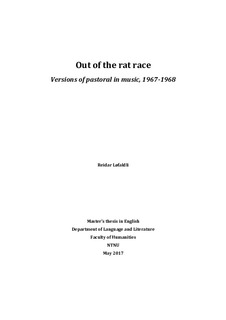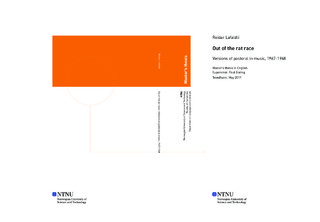| dc.description.abstract | This thesis is concerned with the late 1960s, a time of huge social and political upheaval in the Western world. My argument is founded on the premise that the many changes of the era led to a historical ‘turn’ in the late part of the decade, somewhere between the late summer of 1967 and early summer of 1968. Roughly speaking, society changed from an optimistic 1967 epitomized by the ‘Summer of Love’ into a violent 1968 epitomized by riots and assassinations. The social, cultural and psychological changes in society were reflected in the music and lyrics of some of the most important artists of the time. This happened through a complex, ongoing dialogue where the music was partly responsive and partly an agent of change.
The young people in the Europe and America had, at this point, the freedom to pursue a lifestyle based on individualism and freedom of choice. While people in the mainstream enjoyed the benefits gained by progress, influential artists started longing for something else. They began dreaming of the past, campaigning for communal values and a return to simpler, more innocent times, while making music that abandoned the psychedelic and urban in favour of the primitive and rural – in other words, the pastoral.
In the first part of the thesis, I will describe the term pastoral and point to its long literary tradition. I will then go on to describe the society the artists of the sixties wanted to get away from. With emphasis on the joyful youth culture of 1967, I will show some of the signs pointing forward to turbulent 1968. In the second part I will analyse four significant records from 1968 in detail – four different versions of pastoral in music. All these albums were conceived, written and recorded with the social and political events of the time as a backdrop, and my aim is to show that the records are not only inspired by the same undercurrents, but also internally connected in subject matter, musical style and general philosophy. | nb_NO |

